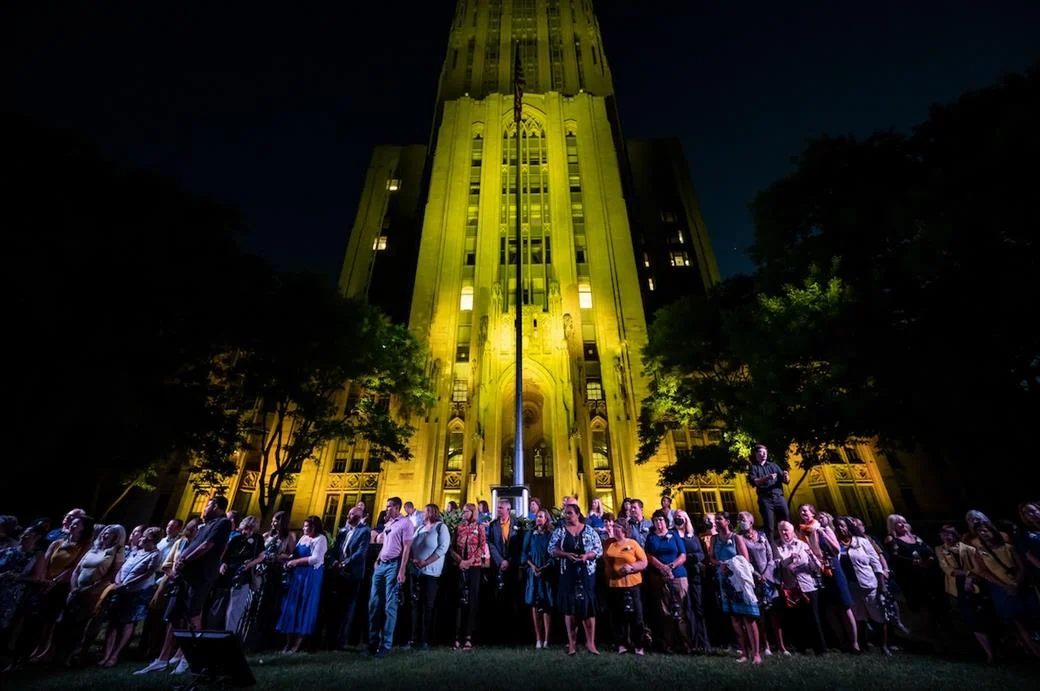October 25, 2023
A message to the Pitt community
We are hearing, both anecdotally and via reports to the Pitt Concern Connection, about a rise in Islamophobic and antisemitic remarks. Students, faculty and staff are reporting hateful comments they’ve seen on social media and heard in the hallways or on the sidewalks.
While it’s acceptable for us to disagree about politics or policies, we cannot and must not disagree about our humanity and the importance of caring for one another.
We cannot let disagreements spill over into hateful rhetoric that impugns people who should matter most deeply to us, or into actions that make our neighbors feel less safe.
Now more than ever, we must lean into our shared strength as a Pitt community. We are a community that recognizes the inherent value of all members and seeks knowledge and understanding amongst those that are different from us.
We are a community that listens and learns from each other to ensure respectful discourse and a free exchange of ideas and speech.
Very importantly, we are a community that has no tolerance for hate and violence aimed at any person or place — and that includes antisemitism, Islamophobia, physical assault, and vandalism.
Each of us must pause, think before we speak or act, and, above all, support and respect our community members. We must remain an institution where you are safe to be who you are, and safe to gather and express your beliefs.
If you are witnessing what you believe to be antisemitism, Islamophobia or other forms of bias or harassment, please report it to the Pitt Concern Connection or contact the Office for Equity, Diversity, & Inclusion directly.
If you or someone you know is in danger, or if you’re concerned about your physical safety, contact the University of Pittsburgh Police Department. Please report any threats or activities that impact your personal safety or the safety of someone else, or that involve physical damage or vandalism.
As we know, many of you are deeply affected by current events, and we encourage you to reach out for support. The University Counseling Center is available for students, and LifeSolutions is available for faculty and staff.
If you are Arab, Israeli, Jewish, Muslim, Palestinian, or a member of other affected Pitt communities, and you have not already connected to one of the independent student groups, I would encourage you to learn more about the resources available on and off campus. Resources for international students are also available through the Office of International Studies. By connecting to others with shared beliefs and backgrounds, you may find the support and fellowship we all need, especially in times of tragedy.
Finally, I want to extend my sincere appreciation to so many who have reached out directly to convey your valued and diverse perspectives. I am proud to be part of this community, and I very much look forward to continuing that exchange.
Sincerely,
Clyde Wilson Pickett, Ed.D.
Chief Diversity Officer
Vice Chancellor for Equity, Diversity, & Inclusion
2023 Community Messages
- Celebrating 33 years of the ADA
-
July 26, 2023
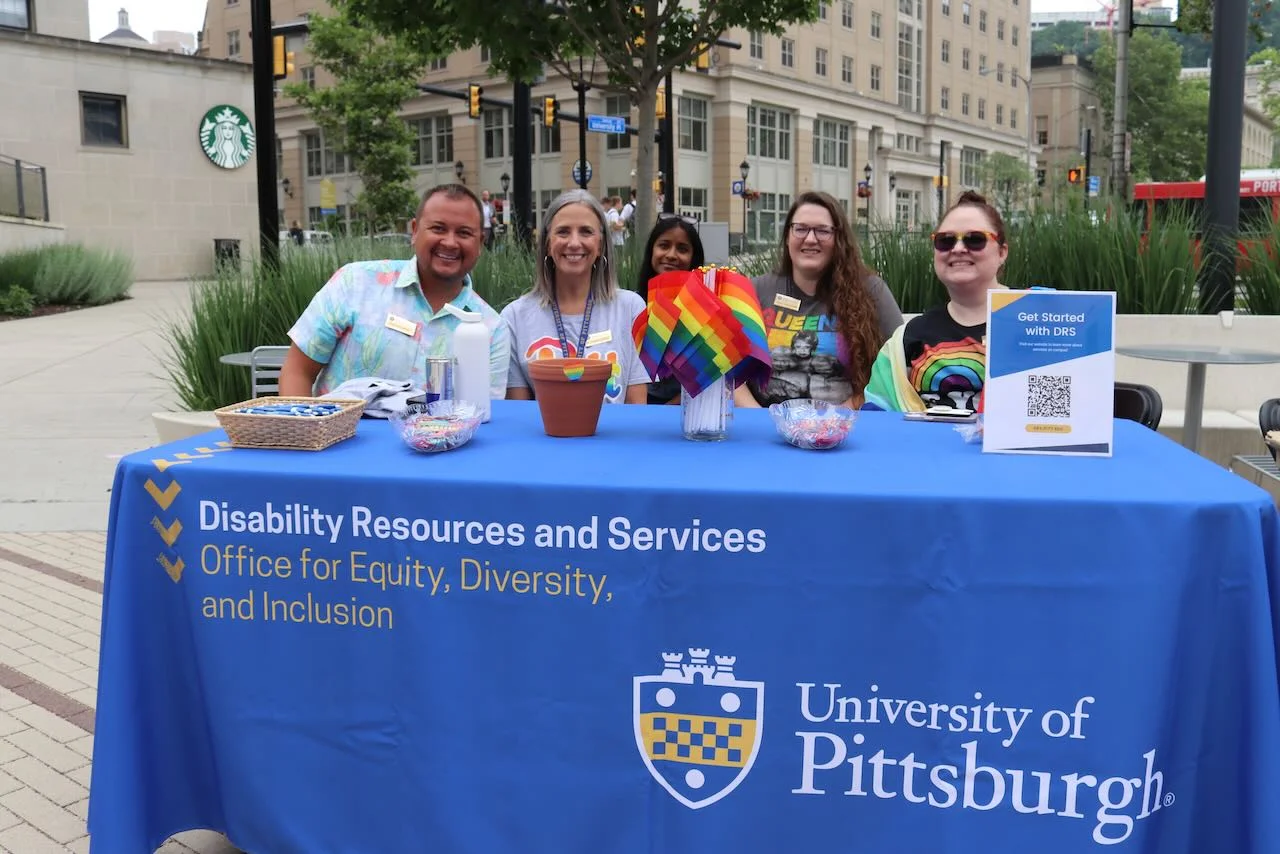
Up to one in four Americans has a recognized disability, making them the largest — and most diverse — minority group in the United States.
The Americans with Disabilities Act was signed into law with bipartisan support on July 26, 1990. In commemoration of that event, each July is celebrated as Disability Pride Month in the United States.
During the 2022-23 academic year, Pitt’s Disability Resources & Services provided accommodations for more than 2,600 students at the University, an all-time high, and more than 100 members of the faculty and staff.
DRS Director Leigh Culley says that so-called “hidden disabilities” — such as chronic health conditions and mental health diagnoses — are the fastest-growing segment of disabilities within the University community. In addition to individuals with limited mobility, DRS also serves individuals who are neurodivergent, have limited or no vision or hearing, have learning disabilities, or need other accommodations.
Culley says that as the University population increases — and awareness of disabilities grows — the need will keep growing as well. “Some of the more common requests include extending time for tests, exams and assessments,” Culley says.
“The complexity of the needs continues to evolve,” Culley says. “About 64 percent of the students we serve report managing two or more conditions.”
Although caseloads are high, Culley says DRS personnel partner with key academic departments and University stakeholders, including the Office of Human Resources, Student Affairs, Facilities Management, Public Safety, and others “to minimize barriers within the University environment.”
“Those partnerships play an essential role in promoting disability as an aspect of diversity, and fostering an inclusive environment for all,” she says.
During Disability Pride Month, Culley encourages members of the University community to share their own stories on social media with the hashtag #DisabilityPride, and to attend events in August when Pittsburgh celebrates Disability Pride Weekend at Schenley Plaza.
- Making plans for summer
-
July 19, 2023
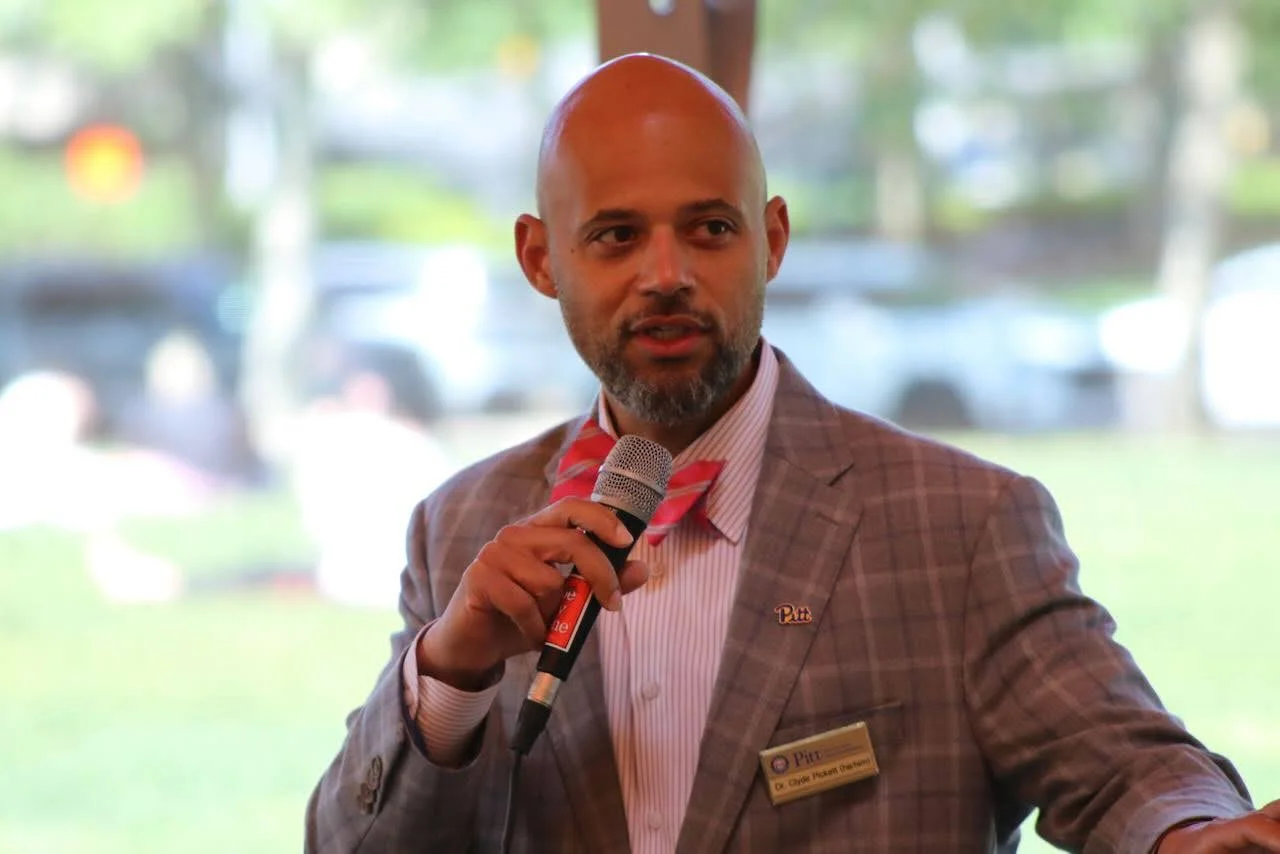
I trust this message finds you all well and taking advantage of what seems to be abundant warm weather. Midsummer offers the opportunity for reflection. This is a time for us to recharge, think about the future, and, in some cases, reflect on areas where we each would like to engage (or re-engage) ourselves with the work to advance equity, diversity, inclusion, and accessibility.
Throughout the year, the OEDI team offers a variety of professional development and learning opportunities, and I encourage everyone to take advantage of at least one of them.
Our signature Diversity & Inclusion Certificate Program includes two required core workshops — “Fostering a Diverse and Inclusive Environment” and “Preventing Sexual Misconduct,” as well as four electives, covering topics such as respect in the workplace, digital accessibility, gender theory, avoiding microaggressions, supporting veterans, and preventing bullying.
These workshops can be personally challenging, even for those of us who work directly advancing equity, diversity, inclusion, and accessibility. While challenging, that’s what makes them so valuable and important. We understand that one of the commitments to this work is to prioritize ongoing learning. If you’ve never taken advantage of the DICP program, I invite you to consider signing up during the 2023-24 academic year.—
This summer, the University is marking a number of important passages, including the arrival of our new chancellor, Joan Gabel, who began work this week.
Chancellor Gabel brings to us a wealth of experience from her previous roles as past president of the University of Minnesota and provost of the University of South Carolina, where she has shown a strong commitment to the values of equity, diversity, and inclusion. I am looking forward to working closely with her in the months and years ahead, and I know you will join me in welcoming her and wishing her much success.—
With her arrival, we also salute Chancellor Patrick Gallagher, who has stepped down after nine years of service to return to teaching.
His tenure has been one of sustained growth for the University, including increased enrollment, record-high numbers of applicants, outstanding academic achievement, and more than $1 billion in sponsored research each year — a new record. I know he takes very seriously the University’s deep and abiding commitment to equity, diversity, inclusion, and accessibility, and I’ve enjoyed working with him and the members of the cabinet. I’m looking forward to his new role at Pitt and, of course, the opportunity to continue calling him a colleague.—
Last, but certainly not least, everyone in OEDI and across Pitt’s Inclusion Network is wishing Paula K. Davis well on her retirement as associate vice chancellor for diversity, equity, and inclusion in the Schools of the Health Sciences.
Paula has spent nearly four decades as a champion for inclusive and more equitable recruitment, training, and placement of under-represented groups across the health professions at Pitt.
From her first day at Pitt, her responsibilities — and her influence — increased steadily. Beginning in 2020, she co-chaired our highly successful Cluster Hire Initiative to recruit 50 new faculty members from diverse backgrounds by 2024; as of this writing, 46 hires have been completed, 43 in the health sciences.
We are all grateful that Paula will remain with the University in a support role for the Pre-Health Scholars Program. Her legacy at the University of Pittsburgh will resonate for generations to come.
Sincerely,
Clyde Wilson Pickett, Ed.D.
Chief Diversity Officer
Vice Chancellor for Equity, Diversity, & Inclusion - Remembering Katie Pope
-
May 31, 2023
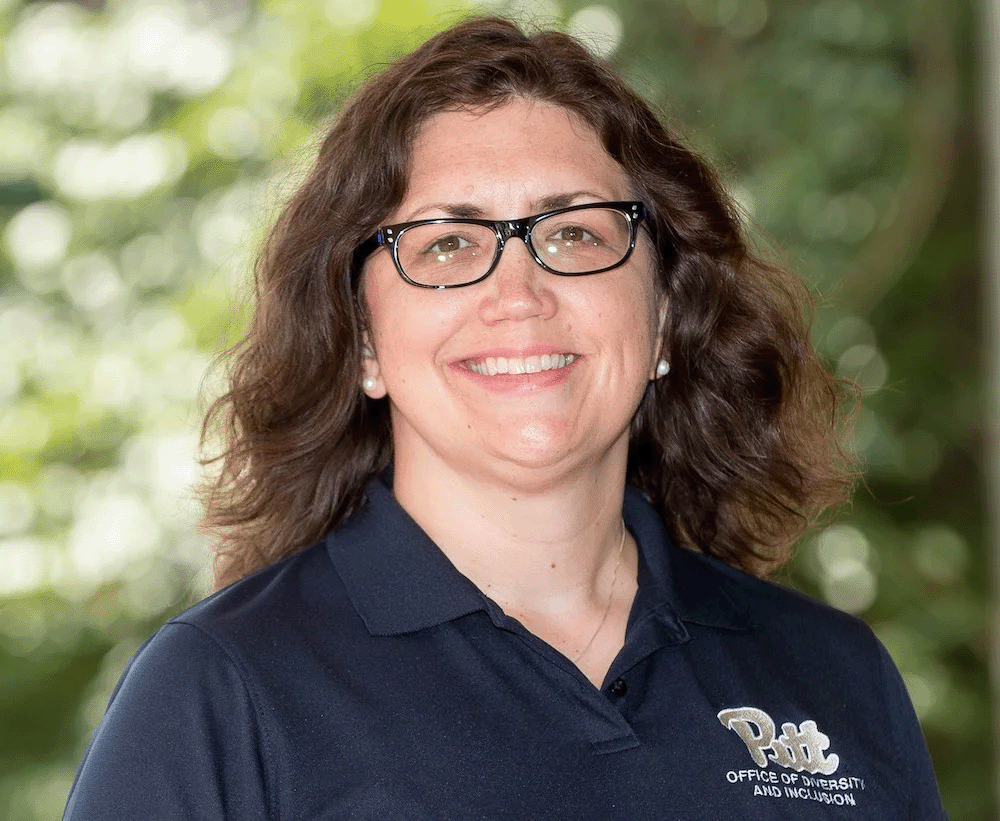
Colleagues are remembering Katie Pope, associate vice chancellor for strategic operations and planning in Pitt’s Office for Equity, Diversity, & Inclusion, as a tireless advocate for women’s rights, social justice and education.
Pope, 49, died May 23 of cancer. A memorial service is planned for 11 a.m. July 8 at the First Unitarian Church of Pittsburgh, 605 Morewood Ave., Shadyside.
Pope joined the University in 2015 as its first full-time Title IX coordinator. She was named associate vice chancellor for civil rights and Title IX in October 2019, then became OEDI’s inaugural associate vice chancellor for strategic operations and planning in 2022.
“Katie helped forge the very foundation of the University of Pittsburgh’s Title IX efforts,” said Chancellor Patrick Gallagher. “Today, we are a better University and a better community because of her steadfast leadership, inspiring example and unyielding quest to do the right thing at each and every turn. My deepest condolences go out to Katie’s husband, Bill, their daughters and her extended circle of family and friends during this difficult time.”
Despite her illness, Pope continued her work until not long before her death.
“All who knew her were struck by her commitment to her work, her keen strategic mind and her empathetic soul,” said Kathy Humphrey, president of Carlow University and former senior vice chancellor for engagement at Pitt. “I have wonderful memories of our time working together in the pursuit of social justice.”
Prior to the appointment of Clyde Wilson Pickett as Pitt’s vice chancellor for equity, diversity, and inclusion in July 2020, Pope served as interim vice chancellor and was part of the transition team upon his arrival.
“I think Katie was, in many ways, OEDI’s heartbeat,” said Pickett, who also serves as the University’s chief diversity officer. “She was my direct partner in this work, and pivotal in my transition to the University. This is a critical loss. Her commitment, her competency, everything that she has accomplished will live on, but it leaves a significant void at the University.”
A native of Ohio, Pope was a 1996 alumna of the University of Dayton. She earned her master’s degree in philanthropic studies at Indiana University in 1999 and went onto complete a second master’s degree in interdisciplinary studies at Iowa State University in 2005. At the time of her death, Pope was pursuing a doctorate from Pitt’s School of Education.
“Katie Pope was one of the most intelligent, strong and empathetic individuals I have ever known,” said Pamela Wilkins Connelly, senior vice president for legal affairs and general counsel for Duquesne University, and Pitt’s former vice chancellor for diversity and inclusion. “She embodied the values of equity, diversity and inclusion not just during her workdays at the Pitt campuses, but after hours, seven days a week, all year round.”
Pope began her higher education career as development director for the School of Architecture at Washington University in St. Louis and later worked in educational programming and outreach for Iowa State. In 2006, she was named director of Purdue University’s Women’s Resource Office, then helped lead its merger into Purdue’s Susan Bulkeley Butler Center for Leadership Excellence.
As managing director of the Butler Center, Pope championed programming and outreach across the Purdue campus for women, underrepresented minorities, indigenous nations and people with disabilities. Connelly said that throughout Pope’s career, her leadership — especially in the area of preventing sexual violence — was exceptional.
“She spent decades fighting to affect change in our culture surrounding sexual misconduct,” Connelly said. “She did not, however, limit herself to higher education where she worked. She would head home after long days fighting for change on campus, and then lend her talents and energy to improving education and prevention in K-12 schools.
“Katie walked the walk when it came to so many important issues of justice,” Connelly said. “She was not afraid to face and work to address society’s most difficult problems.”
Immediately upon her arrival at Pitt, Pope expanded the outreach and programming of what was originally known as the Office for Diversity & Inclusion, helping to set its goals and direction and recruiting and hiring some of its key personnel.
“She was central to the operations of the entire unit,” Pickett said. “No matter where you go around the University of Pittsburgh, she had connected with, and had touched, people. And she was genuine and authentic in her exchanges with people. She was someone you knew was dependable.”
Earlier in her career, Pope served as Title IX coordinator for Allegheny College in Meadville and as executive director of the Assault Care Center Extending Shelter & Support in Ames, Iowa. She also had worked at a women’s shelter in New York City and for the YWCA in Ames.
“Her intelligence and compassion led her to her professional field, her tenacity and dedication led her to create real change, and her heart and belief in others made her an exceptional leader,” Connelly said. “I am sure that her legacy at Pitt and beyond will continue.”
Pope’s death is a loss not just for the University, Pickett said, but for higher education in general. “She was a resource for many people — she connected them — and provided them with collegiality, support and advocacy,” he said. “She had connections with colleagues around the country, and in our region, she was well-liked and well-respected.”
Pitt’s progress in equity, diversity and inclusion “owes much to Katie’s strength, her willingness to speak truth to power, and her unique-skills in problem-solving,” Humphrey said. “She will be missed, but the world is better because she passed our way and touched so many lives. I pray that God’s peace will surround her family and the Pitt community.”
Pope is survived by her husband, Bill Kannel; daughters, Ellie and Erinn; parents, Betsy and Ed Pope of Pittsburgh, formerly of Toronto, Ohio; and extended family and friends.
A memorial service is planned for 11 a.m. July 8 at the First Unitarian Church of Pittsburgh, 605 Morewood Ave., Shadyside.
In lieu of flowers, the family has suggested donations may be made to a GoFundMe account that has been created to support the ongoing education of Pope’s daughters, or to charities focused on cancer research. - Equity means accessibility for everyone
-
May 18, 2023
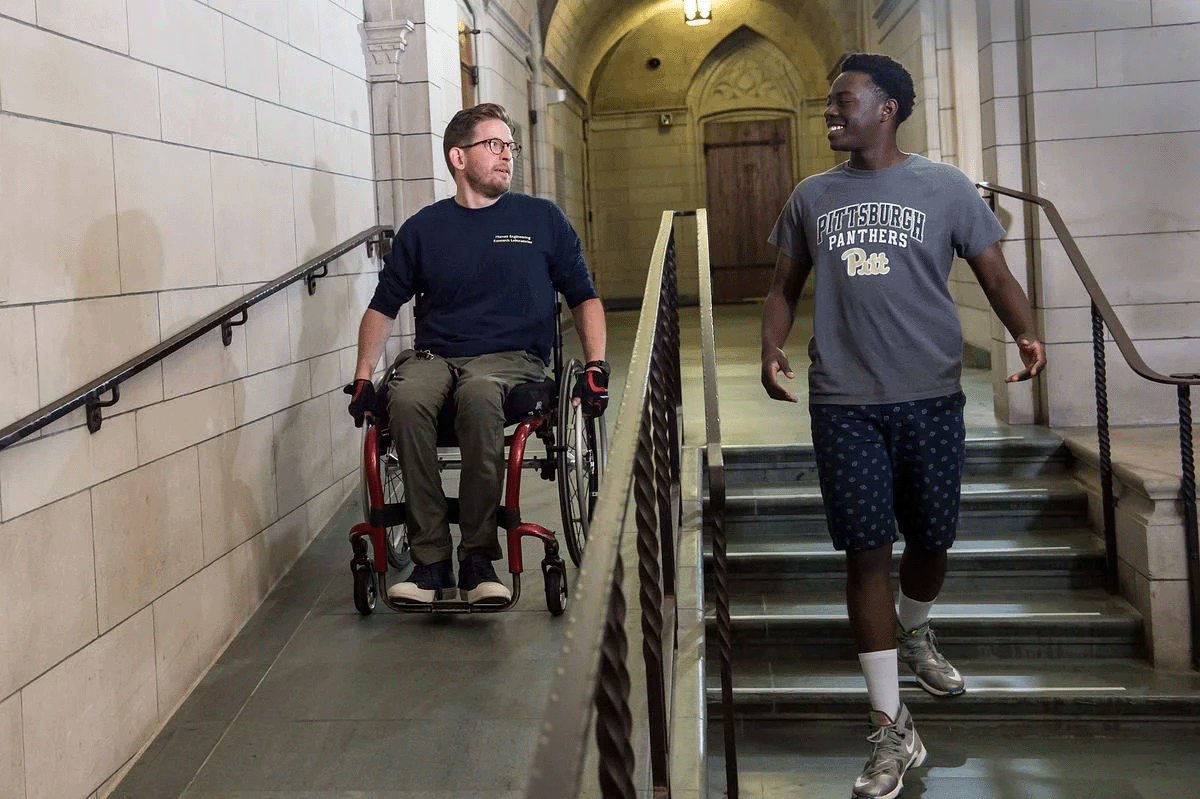
Photo: Students Aaron Anderson, left, and Glenn Ayieko, demonstrate accessibility improvements around the Cathedral of Learning, Aug. 14, 2018.
It’s been more than 30 years since the Americans with Disabilities Act (ADA) was signed into law by President George H.W. Bush. One of the champions of that bill, then-U.S. Attorney General Dick Thornburgh — a 1957 Pitt Law graduate — called it one of the proudest moments of his life, and a day of “emancipation” for millions of Americans.
Accessibility is a key pillar of the equity, diversity, and inclusion equation. “Equity” means allocating resources and advancing opportunities in ways that ensure that everyone has the maximum chance to succeed in their life and career. Opportunities to learn and thrive must not be inaccessible to anyone because they have limited mobility, vision, or hearing.
It should be noted that the ADA was not uniformly welcomed in 1990. Many of the same forces who now object to equity, diversity, and inclusion fought to stop the ADA, calling it an “expensive headache,” “disastrous for business,” and an infringement on religious liberties.
Yet up to 1 out of 4 Americans has a recognized disability, such as difficulty walking or climbing stairs (12 percent), difficulty hearing (6 percent) or limited vision (4.8 percent). I think most of us agree that we do not want to return to a world where 25 percent of Americans are excluded from daily life.
On our campuses, there is a general understanding that accessibility is essential and a necessity, not a luxury. We also recognize that providing accessibility for people with disabilities makes our facilities easier to use for everyone. This work remains a front and center priority for all diversity, equity, and inclusion efforts.
Over the past six years, our Disability Resources & Services team has more than doubled the number of accommodations it provides to students, whether in classrooms, housing, or dining services. Many of the people DRS is helping have what might be considered a “hidden” disability — a long-term health condition that isn’t immediately apparent to an observer. DRS works tirelessly to explore every option available to provide fair and equitable access for all students, faculty, and staff.
I have watched DRS staff consistently strive to deliver services in a way that is transparent, outcomes-focused, and above all, dedicated to equity. While we recognize the need is growing — and at times threatens to outpace our efforts to keep up — the University understands that there can be no equity, diversity, and inclusion without accessibility.
This effort also includes digital accessibility. We saw during the COVID-19 lockdown and in the months that followed that digital access is an essential lifeline for basic human services, including healthcare and education. As a society I think we all understand that there can be no going backward.
Today (May 18), Pitt will join institutions around the world that are celebrating Global Accessibility Awareness Day — a time set aside to remember that websites and social media must be intentionally designed in ways that provide successful outcomes to everyone, regardless of physical ability or health challenges.
We’ve posted a list of resources on our website, and if you or someone you know is responsible for your office, unit, or department’s website or social media feed, I encourage you to take a look at some of the best practices outlined and share this information broadly.
As I close, I wish you all the best for the rest of May. If you are like me, you appreciate the good weather and are excited about the opportunities to take advantage of the many outdoor community activities. We encourage you to stay in touch with us during the upcoming summer months and look forward to opportunities to be together in community.
Sincerely,
Clyde Wilson Pickett, Ed.D.
Chief Diversity Officer
Vice Chancellor for Equity, Diversity, & Inclusion - Wishing our University community a blessed Ramadan
-
March 22, 2023
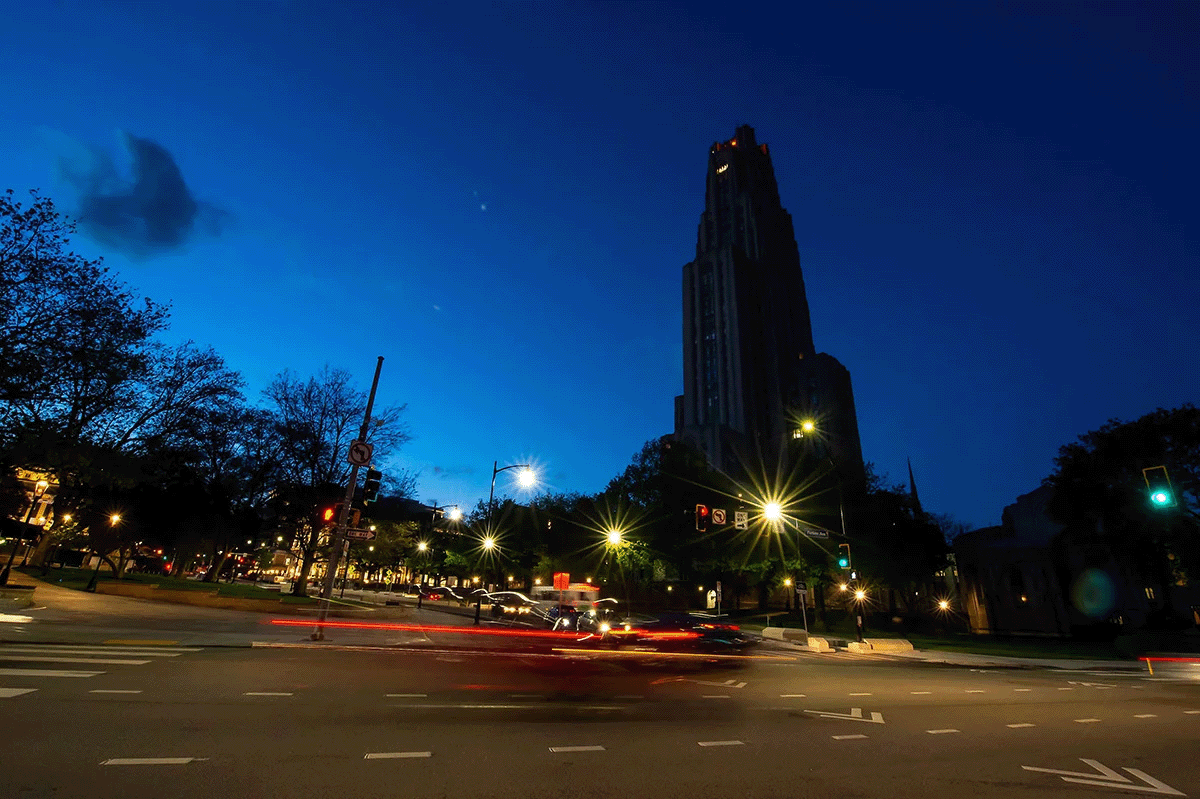
Community:
Ramadan is the holiest month of the year on the Muslim calendar, observed as a time for reflection, prayer, purification, and charitable acts.
In 2023, Ramadan in the United States will begin this evening (March 22), and continue through Friday, April 21.
Fasting during Ramadan from sunrise to sunset is one of the five pillars of Islam. During Ramadan, suhur is the meal eaten before dawn to start the day; iftar is the meal that breaks the fast. Eid al-Fitr is the three-day celebration of the end of this fasting period.
OEDI has gathered some resources for Muslim students, faculty, and staff at our website.
For those of you who are observing, Ramadan Mubarak (blessed Ramadan)! Make sure to stay healthy while you’re fasting. Cornell’s website offers tips for fasting safely and eating wisely.
Pitt Eats is making suhoor packs available, both in vegan and non-vegan varieties, and there are Halal-certified vendors both on and off campus. A list of those vendors is available on our website.
The Islamic Center of Pittsburgh, located just two blocks from the Cathedral of Learning, is a great partner with the University community and a wonderful resource for the city. A prayer schedule is available on their website.
For everyone in the community, remember that some of us may need to take time for prayer, worship, and gathering together over the next few weeks; and some of us may need to adjust our class or work schedules so that we can eat before sunrise. Guidance on religious accommodation is available at the Provost Office’s website.
The University community is stronger for learning about, respecting, valuing, and celebrating the many traditions and beliefs of our individual members. Over the next few weeks — and, indeed, throughout the year — may we all embrace the values of Ramadan, including forgiveness, gratitude, generosity, kindness, and patience.
Sincerely,
Clyde Wilson Pickett
Chief Diversity Officer
Vice Chancellor for Equity, Diversity, & Inclusion - Our commitment to equality, inclusion, and civil rights
-
March 10, 2023
Community:
The University of Pittsburgh has encouraged free and open debate on controversial subjects for more than 200 years. The exchange of ideas and academic freedom are pillars of the academy and higher education.
While we must support and protect this exchange, it should be clear that the existence of marginalized and under-represented groups of people is self-evident and irrefutable.
We remain committed to embracing the diversity of our community, including those members of our community who are transgender and gender queer.
These are values for which we have never wavered from and remain firm. We remain committed to supporting equality, inclusion, and civil rights, including protections for the LGBTQIA+ community.
To the Pitt community, especially those who are trans, or who have friends or loved ones who are gender non-conforming, please know that you are seen, valued, and that you have our support.
- If you’re aware of discrimination against anyone based on their gender identity or expression, please report such incidents to the Pitt Concern Connection by texting 412-903-3456, calling 800-468-5768, or completing this online form.
- You also can reach out to the Office for Equity, Diversity, & Inclusion at 412-648-7860 or diversity@pitt.edu.
- If you are in need of resources that support the LGBTQIA+ community, lgbtq.pitt.edu has a list of organizations and programs that provide support and networking.
- If you have concerns about your own mental health, resources are available for students through the University Counseling Center at 412-648-7930; staff and faculty are encouraged to contact Life Solutions at 1-866-647-3432, which provides 24/7 crisis counseling and support.
Sincerely,
Clyde Wilson Pickett
Chief Diversity Officer
Vice Chancellor for Equity, Diversity, & Inclusion - A reflection on the news from Memphis
-
Jan. 27, 2023
Community:
We find ourselves in a situation that has become all too familiar: A Black motorist is dead following an exchange with police officers.
While the facts surrounding the death of Tyre Nichols are still being uncovered, we know that five police officers have been charged in what media outlets are describing as a violent death.
For many of us, watching the murder of yet another Black man is too much. The details of this case, the persistence of tragedies such as these, and the heightened risks that some in our society face—simply because of our skin color—resonate deeply with me and many others in our community.
As an educational institution that is deeply committed to advancing equity and diversity, we must be proactive in calling out and confronting systemic racism. We must work to bridge the deep gap of mistrust between law-enforcement officers and the communities they have pledged to protect, including those that are predominantly Black and African American.
In the immediate aftermath of the release of the video, we join our community and University partners in holding space for students, faculty, and staff to speak out about their experiences and concerns, share their grief, and address their trauma.
There are a number of on-campus opportunities and resources to support our community members during this difficult time:
- Beginning this weekend: The Division of Student Affairs’ Office of Inclusion & Belonging will provide students with space to process and reflect on these events. The sixth floor of the William Pitt Union will be open from 12 noon to 10 p.m. Saturday and from 3 to 10 p.m. Sunday.
- On Monday (Jan. 30): Student Affairs will open the sixth-floor space at the WPU from 3 to 6 p.m. to meet with any student impacted by this news. If you would like to talk about what you’ve seen and heard, there will be staff available to listen.
- On Wednesday (Feb. 1) from 1 to 2 p.m.: The Office for Equity, Diversity, & Inclusion; the Division of Student Affairs; and the Center for Race & Social Problems will hold space in Room 548 of the William Pitt Union for faculty and staff to engage in dialogue.
- At any time: You may also reach out to the Office for Equity, Diversity, & Inclusion at 412-648-7860 or diversity@pitt.edu. Mental health resources are available for students through the University Counseling Center at 412-648-7930; staff and faculty are encouraged to contact Life Solutions at 1-866-647-3432, which provides 24/7 crisis counseling and support.
Sincerely,
Clyde Wilson Pickett, Ed.D.
Chief Diversity Officer
Vice Chancellor for Equity, Diversity, & Inclusion - Resources available following California attacks
-
Jan. 24, 2023
Resources available following California attacks
At what should be a time of joyous celebration of the Lunar New Year, Americans once again are grieving victims of violence following the tragic shootings in California. We mourn the lives of those lost and will keep all of the people affected in our thoughts.
We know these acts of terror have, in particular, greatly impacted the Asian-American and Pacific Islander (AAPI) community. Incidents of mass violence can trigger feelings of confusion, fear, helplessness, and overwhelming anxiety, and manifest in a variety of symptoms. If these incidents are causing you stress or triggering underlying trauma, help is available both on- and off-campus.
Please reach out and know you are not alone.
Mental Health America offers suggestions for coping with your feelings, as well as specific resources for the Asian-American and Pacific Islander community at its website.
Support is available through the University Counseling Center (UCC). Students are encouraged to utilize the drop-in services, no appointment necessary, from 9 a.m. to 4 p.m. Monday through Friday. At the UCC, students can connect with a counselor to develop a plan that best supports their needs. Additional services are also available including self-help tools, workshops, group counseling, and individual counseling, among others.
Additional Resources:
University of Pittsburgh Faculty and Staff Assistance Program: Life Solutions, through the University’s Office of Human Resources, provides 24-hour crisis support at 1-866-647-3432 or online.
UPMC’s resolve Crisis Center: resolve offers 24-hour crisis counseling and intervention services for all residents of Allegheny County at 1-888-7-YOU-CAN (1-888-796-8226) or online.
National Resources
Mental Health America: MHA offers specific resources targeted to Asian Americans and Pacific Islanders, including first-generation Americans. Text "MHA" to 741741 for free text-based support; call 1-800-969-6642; or visit the MHA website.
U.S. Department of Health & Human Services Disaster Distress Helpline: Call or text 1-800-985-5990 for immediate support and counseling. Interpreters are available in more than 100 languages for non-native English speakers.
- May we use 2023 as a year to serve
-
Jan. 12, 2023
The beginning of the spring semester provides the opportunity for us to prioritize our focus on the year ahead and on our new year’s resolutions. I hope the start to your year has been positive.
While we’re focusing our attention on our goals, I encourage all of us to think about ways we can serve our community (and beyond) to advance equity, inclusion, accessibility, and opportunity for everyone. As we prepare to celebrate the life and legacy of Dr. Martin Luther King Jr. next week, may we be reminded that service to others was central to his message.
In a famous sermon delivered in 1968, just two months before he was murdered by an assassin, Dr. King urged his church congregation to avoid the “Drum Major Instinct”—the feeling that we should be leading a parade in our own honor, with all eyes watching us. Dr. King pointed out that the Christian Bible’s definition of “greatness” doesn’t include fancy clothes, a fine home, or other material wealth; instead, he said, the greatest among us are those who are called to serve the less fortunate.
By that definition, Dr. King was saying that every person can achieve greatness, because everyone has the capacity for service. So as we remember Dr. King on Monday, let’s all reflect on the various ways we are currently serving, and preparing to serve, the community both on- and off-campus.
The University has traditionally encouraged each of us to mark Martin Luther King Jr. Day by volunteering in some service to the community. We encourage you to support MLK Social Justice Week activities at Pitt.
Before we know it, February will be here, and we’ll be observing Black History Month. The theme this year, as selected by a national group of historians and scholars, is “Black Resistance.”
The theme represents an opportunity for each of us to reflect not just on the history of struggle for equity, humanity, and social justice, but also on the need for contemporary efforts to promote progress. The need for Black resistance to confront injustice and encourage activism, social justice, and racial equality is alive and well.
Throughout 2023, may we be reminded that when we answer the call to resist oppression in all forms and act against intolerance, we are performing a greater service to humanity, just as Dr. King encouraged us to do.
Your OEDI team is excited about the semester ahead and the opportunity—and need—to advance our work. While the values of social justice inform our activities all year long, next week is a welcome opportunity to gather and celebrate those values, as well as the life of Martin Luther King Jr., who made the ultimate sacrifice to uphold them.
I’m looking forward to our time together this semester and the various events we have planned across our campuses next week and beyond. I look forward to celebrating social justice and honoring Dr. King’s legacy with you next week.
Sincerely,
Clyde Wilson Pickett
Vice Chancellor for Equity, Diversity, & Inclusion
Chief Diversity Officer - Here's to 2022—and warm wishes for 2023
-
Dec. 7, 2022
The end of the calendar year presents an opportunity for us to think about where we've been over the past 12 months, including all we have experienced and accomplished. It also presents an opportunity for us to think about what we want to achieve in the next year.
As a team, the OEDI and our Pitt community experienced a number of successes in 2022. Yet we also know that we have a lot of work to do to impact equity, diversity, and inclusion. We understand that our work doesn’t end, and it requires collaboration and commitment as we pursue the goal of an equitable and inclusive environment for our University community, our Western Pennsylvania home, and beyond.
I’d like to spotlight some of the areas where we're planning improvements. Front and center is the need for us to prioritize education and prevention of sexual harassment and violence. We've heard loud and clear from our community, we’ve taken your concerns to heart, and we're addressing them. Our Title IX office is building for the future and we will continue to share more information on ways we are working to improve in the months ahead.
We also are focusing our attention on retaining and developing a diverse team of faculty and staff at Pitt. While we know our effort to attract new colleagues is having an impact, our work to retain and develop community members is an area that requires our full attention. We look forward to working with you and our colleagues around Pitt to make a difference in this space. I hope you'll continue to walk with us on this journey and continue to encourage us when we need to do better.
Focusing on our team successes is important; so, too is the need to reflect on our individual experiences. The end of the year and semester both provide an opportunity for us to review all we have experienced. It’s a chance for us to tally our progress towards our goals, and perhaps, most importantly, an opportunity to examine our self-care.
In 2022-23, the Year of Emotional Well-Being at Pitt, let’s remember the most important part of our community is the people. We should take this time to reflect, recharge and rejuvenate our thoughts and energy for the time ahead. We can’t care for or support others unless we do the same for ourselves first.
I wish you well on the final weeks of 2022. However you mark the end of the calendar year, I hope it's safe and fun, and that you feel ready to take on the second half of the academic year.
We look forward to seeing you in 2023!
Sincerely,
Clyde Wilson Pickett
Vice Chancellor for Equity, Diversity, & Inclusion
Chief Diversity Officer - Dear Pitt Community Members:
-
Nov. 21, 2022
Following the tragic events in Colorado, I would like to remind everyone that the University of Pittsburgh is committed to supporting the health and well-being of all students, faculty and staff.
If you are a member or an ally of our LGBTQIA+ community and you are feeling overwhelmed or traumatized: Remember that support is available. You are never alone.
Although Pitt students are currently on Thanksgiving break until Nov. 28, counseling services are within reach both on campus and throughout the Pittsburgh region. I have identified some key services and resources, available locally and nationally, below.
As always: Please do not hesitate to reach out for support if you or someone you know is in need.
Sincerely,
Clyde Wilson Pickett
Vice Chancellor for Equity, Diversity, and InclusionLocal Resources
University of Pittsburgh Counseling Center: Open to all students from 9 a.m. to 5 p.m. Nov. 21, 22 and 23. Closed Nov. 24-27 in observance of Thanksgiving. Telephone support will remain available through the holiday at 412-648-7930. For more information: https://www.studentaffairs.pitt.edu/cc/
University of Pittsburgh Faculty and Staff Assistance Program: Life Solutions, through the University’s Office of Human Resources, provides 24-hour crisis support. 1-866-647-3432 or https://www.hr.pitt.edu/current-employees/work-life-balance/lifesolutions
UPMC’s resolve Crisis Center: resolve offers 24-hour crisis counseling and intervention services for all residents of Allegheny County. 1-888-7-YOU-CAN (1-888-796-8226) or https://www.upmc.com/services/behavioral-health/resolve-crisis-services
National Resources
LGBT National Hotline: Anonymous, free, confidential support and referrals to local resources. Hours are 4 p.m. to midnight Eastern time Mondays through Fridays and noon to 5 p.m. Eastern time on Saturdays. 888-843-4564 or https://www.lgbthotline.org/national-hotline.html
LGBT National Youth Talkline: Free, confidential peer support for the LGBTQ community, focused on young adults up to age 25. Hours are 4 p.m. to midnight Eastern time Mondays through Fridays and noon to 5 p.m. Eastern time on Saturdays. 800-246-7743 or https://www.lgbthotline.org/youth-talkline.html
Trans Lifeline: Trans Lifeline is a hotline staffed by transgender people for transgender people who are experiencing a crisis. They will do their best to connect the caller with local services that can help. 877-565-8860 or http://www.translifeline.org
The Trevor Project: The Trevor Project offers crisis counseling and support to LGBTQ young people and maintains a 24-hour suicide prevention hotline. 866-488-7386 or www.thetrevorproject.org

